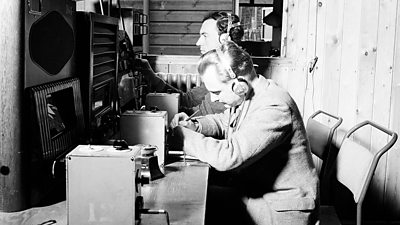As well as making programmes for the public, the wartime ±«Óãtv was involved in a range of top secret activity, working with closely with the intelligence agencies and military. Here, newly-released archives lift the veil on the broadcaster’s role in this clandestine world of signals, codes, and special operations.
It’s always been known that just before the war began in September 1939, the ±«Óãtv’s fledgling television service was unceremoniously shut down for the entire period of the conflict.
What’s less well-known is that, far from being mothballed, the television facilities of Alexandra Palace were carefully kept ticking-over by a small team of engineers – and that the transmitter which had supposedly been silenced for reasons of national security was soon sending out its signals again.
From May 1940, Alexandra Palace’s ‘vision’ transmitter was being tested for its ability to jam any messages passing between tanks in an invading German force. The following year, its sound transmitter was being deployed for something called ‘bending the beam’. One of the ±«Óãtv’s engineers who remained on site was Tony Bridgewater:
Tony Bridgewater account only describes a small part of the ±«Óãtv’s extensive collaboration with the RAF.
As well as disrupting the Luftwaffe’s navigational system in March 1941 through an operation code-named ‘Domino’, and supplying skilled personnel to the RAF’s radar-testing station in Suffolk, ±«Óãtv engineers also helped in operation ‘Washtub’, which used ±«Óãtv transmissions to guide homeward-bound RAF bombers, and in operation ‘Corona’, which disrupted communications between German fighter pilots.
It was, however, through its regular broadcasts to occupied Europe, that the ±«Óãtv provided its most consistent clandestine support for the Allied war effort.
It was the September 1938 Munich crisis which had provoked the launch of a hastily-arranged European Service – as one of its founding figures, Leonard Miall recalls in this extract from his oral history interview:
The ±«Óãtv’s broadcasts to Europe were, then, gently but insistently propagandist. But in the front line war of words between Britain and the Axis powers, the ±«Óãtv was especially keen to promote editorial values of ‘truthfulness’ and accuracy. In particular, it felt that the trust of any foreign listeners would only be earned – and the propaganda war won –if it could report British failures as well as British successes.
It’s a theme which is explored in this oral history interview with the historian Alan Bullock, who joined the ±«Óãtv’s European Service in 1940:
The complicating factor in all this was that in wartime the ±«Óãtv was duty-bound to operate under Government direction.
The ways in which these powers of censorship and control operated on the ±«Óãtv Front are explored elsewhere on this website, in 'The Bore War'.
When it came to broadcasts directed to Europe, the ±«Óãtv had to deal with an especially complex array of competing Government ministries and security services – ranging from the Foreign Office and the Ministry of Information through to the Ministry of Economic Warfare and the Political Warfare Executive.
Later in the war, there would also be the Special Operations Executive, which organised subversive operations.
Relations between broadcaster and these Governmental bodies were often smoothed-over by an exchange of key personnel – and informal background briefings. The ±«Óãtv, for example, was obliged to accept the ex-diplomat Ivone Kirkpatrick as ‘Foreign Advisor’ – though he quickly turned out to be someone closely attuned to the ±«Óãtv’s own sense of purpose.
Even so, for a ±«Óãtv which believed in its own independence it was a difficult framework to navigate – as Harman Grisewood, another senior member of the wartime European Service, explains in this extract from his archive interview, where he points out the special challenge of dealing with the Political Warfare Executive from 1941 onwards:
One member of the ±«Óãtv’s staff who was seconded to the Political Warfare Executive was Elisabeth Barker, who had joined the ±«Óãtv in 1934.
In her interview for the ±«Óãtv Oral History Collection, she discusses her own area of expertise, the Balkans, and the pressing need to weigh-up whether Britain’s interest in undermining the German occupiers was better served by supporting Serbian and Croatian nationalists or Tito’s Communist Partisans.
The interview offers a candid insider’s account of how the fraught relationship between the ±«Óãtv and the PWE developed in practice, especially after the PWE moved into Bush House itself:
Secret Codes
The ±«Óãtv’s European Service also regularly transmitted code messages to undercover operatives and resistance groups working in German-occupied countries.
This was a tricky task for all sorts of reasons. For one thing, the ±«Óãtv’s regular programmes would soon be ruined if they had to include too many bizarrely-worded messages in their scripts. For another, while the PWE and various Government secret service departments had their own agendas, so too did all the exiled Governments from across the continent now gathered in London – all of which were just as keen to use the ±«Óãtv’s special language services to send back home their own propaganda and messages.
Who actually was in charge – and how could the ±«Óãtv ensure it wasn’t being fed false messages by enemy agents?
An elaborate system of codenames, hand-delivered mail, and security-checks was introduced. This was particularly felt to be necessary when the ‘Free French’ in London wanted to take responsibility for directing resistance activity in their homeland.
The document below sets out the arrangement agreed with the ±«Óãtv regarding messages to France: that they would need to be co-ordinated by – and passed through – the Special Operations Executive (SOE) or the Secret Intelligence Service (SIS), better-known as MI6:
What, then, were these coded messages actually like?
Usually, they consisted of a few phrases dropped into a programme script or foreign language news bulletin.
The document below, from the ±«Óãtv’s written archives, shows the unusually long list of code messages to the French Resistance broadcast on the night of 5 June 1944. It was the eve of D-Day, and the small pencilled cross next to the ninth message, indicates that it was this phrase in particular – ‘Berce mon Coeur d’une langueur monotone’ – that signalled the invasion was about to begin:
Not every coded message came in the form of spoken words. The document below reveals the role of music in secret messages broadcast to Poland.
It involved Polish government representatives turning up, and using the codename ‘Peter Peterkin’, to provide programme staff with a particular piece of music.
±«Óãtv staff would arrange for the Polish news to run for a shorter length of time than usual, so that the record ‘Peterkin’ supplied could be played:
What could go wrong? Plenty of things, apparently. The ±«Óãtv’s written archives include several other secret memos which complain of producers forgetting to play the record, or playing the wrong side of the record. And on each occasion, it was feared that special operations might have been affected and lives put at risk.
There’s an extraordinary insight into this highly secret work contained in one of the ±«Óãtv’s oral history interviews.
In this recording, Alec Sutherland describes being called back to the ±«Óãtv from his secondment with the American Army, in order to keep an eye on proceedings in the Bush House studios:
One further, and quite remarkable account of secret wartime work is contained in the ±«Óãtv Oral History Collection. And it is perhaps the most extreme illustration of the kind of webs of connection that were spun between the ±«Óãtv and British intelligence services throughout the Second World War.
In this interview, Owen Reed describes in detail how, while working at the ±«Óãtv’s Cairo office, he was suddenly recruited by the secret service and despatched on special operations in the Balkans. It was an event that changed the entire course of his career.
He begins his fascinating account with a description of the words spoken by the man who recruited him:
Further reading:
- Asa Briggs, The History of Broadcasting in the United Kingdom, Volume III: The War of Words 1939-1945 (1995)
- Sebastian Ritchie, Our Man in Yugoslavia: The Story of a Secret Service Operative (2004).
- David Garnett, The Secret History of PWE (2002).

